[Don't miss your chance to get your copy of Rediscovery: Science Fiction by Women (1958-1963), some of the best science fiction of the Silver Age. If you like the Journey, you'll love this book (and you'll be helping us out, too!)]
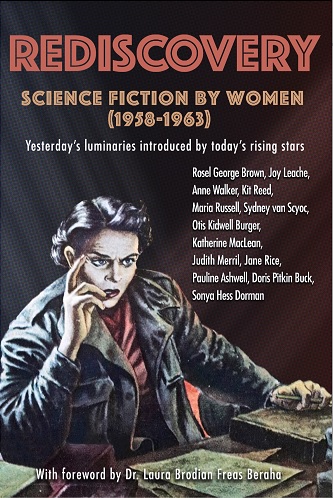
[This month's Galactoscope features two global catastrophes, two collections, and four authors you've almost certainly heard of!]

by Jason Sacks
The Penultimate Truth, by Philip K. Dick
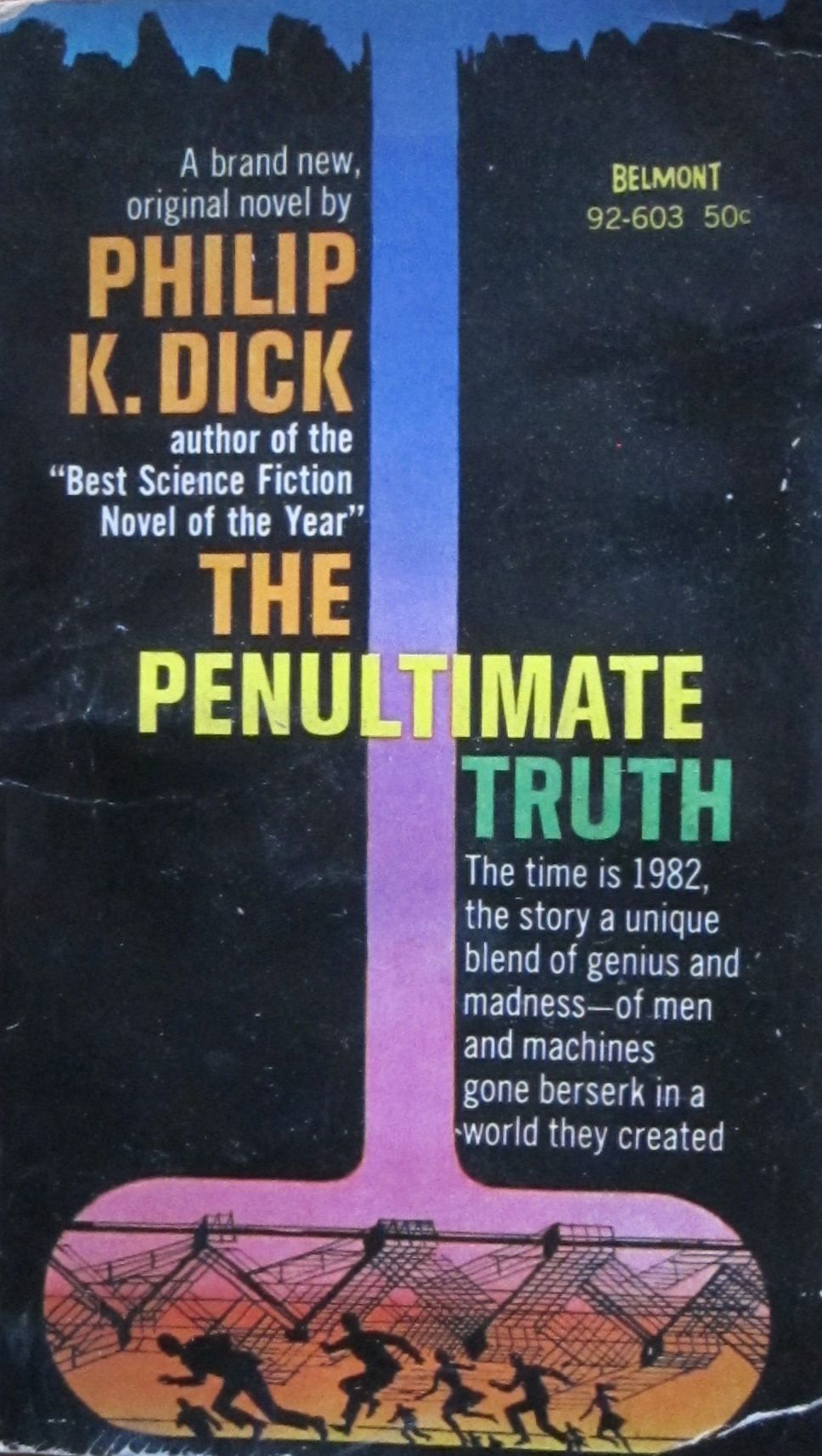
Like many fans, I first became really aware of Philip K. Dick after he won the 1963 Hugo Award for Best Novel for his remarkable The Man in the High Castle. That book dazzled in its chronicle of an alternate history in which the Nazis and Japanese won World War II (which opened up many areas of thought and conversation for me and my friends) as well as in its brilliant world-building and the fascinating, multifaceted characters at the heart of Dick's award-winner.
High Castle was also an amazingly tight novel, packing a dense plot into its mere 240 pages. As many of us Dick fans have learned, not all of his works are quite so tightly plotted. I adored his Martian Time-Slip and Dr. Bloodmoney from last year, but those books tended to both delight and annoy in their meandering, nearly stream-of-consciousness styles.
The newest Philip K. Dick novel, The Penultimate Truth (just out in paperback from Belmont) fills a bit of the gap between his ’62 masterpiece and the challenging ’63 books. This thoroughly delightful book wanders a bit but always held me in its comforting grasp.
The Penultimate Truth is shambolic and episodic, but that approach serves the work well. Its main characters are living shambolic lives, which Dick depicts as full of odd episodes which occasionally have great and beautiful moments of transcendence, even in the post-apocalyptic wasteland in which the book is set.
Note that this review will reveal elements of the book, comments that "spoil", if you will, so skip down to the next review if you love surprises in your fiction.
In the future world of this book, much of humanity lives in massive underground bunkers, nicknamed anthills, in which they build weapons and medical devices for the nuclear war they believe is ravaging the surface of the Earth. When Nick St. James, the president of one anthill, makes his way to the surface, St. James discovers his people have been lied to. The world on the surface has survived nuclear devastation and has emerged into a unique and odd civilization. Needless to say, the revelation of the relatively peaceful world surface changes nearly everything.
What makes this novel so special, though, is that those revelations don't change the way St. James views his world. He doesn’t become a noble crusader for truth or a vengeful destroyer of the new civilization. Instead our protagonist goes the opposite way of most heroic leads. Instead of rebelling, he goes out of his way to allow the world to stay in its current state. He will not let the truth of his world change life in the anthill. The penultimate truth of the story is the truth behind the nuclear war. But the ultimate truth is more powerful: it is the special bond society creates, the relationships created and enduring for decades, and the lies and half-truths that are necessary to perpetuate that society.
This description makes The Penultimate Truth sound heady and brainy, and it is filled with a intriguing level of intelligence and wisdom about human nature. But it is also has the several elements we have come to expect from Dick’s finest work.
First and foremost, this is an exciting story, with scenes of high adventure, escapes and shootouts which keep the reader turning the page. There are mysteries piled upon mysteries, characters who shift and change as the story proceeds only to have them revealed in ways for which the reader was foreshadowed but for which he likely could not have anticipated.
Secondly, this is a wise and fascinating study of human nature. The Penultimate Truth is about jealousy and lust for power balanced with trust and love for family and friends. It sets stability and chaos in opposite sides of the metaphorical coin in ways few other novels of any type have explored, and in doing so shows the power of novelistic science fiction in the hands of a master of the medium.
Thirdly, this book seems to explode with ideas, from the anthills (an idea Dick has explored in some of his short fiction such as “Second Variety”) to the vast demesnes in which the surface dwellers live, to the vast conspiracies used to keep ordinary people following their leaders. In fact, it is in that last set of ideas that Dick falls down a bit for me. I had trouble imagining a government systematically lying to its people in the way described here. In a world in which leaders are elected by the governed, there is no reason for leaders to lie to their people. [Oh, my sweet country mouse…(Ed.)]
And the last element I’ve come to love in Dick’s work comes from the very end of the book. In my mind there are two endings to this novel, and in fact I won’t reveal them here so you can experience them yourself. But I’m curious how many readers wish The Penultimate Truth had ended with the deeply ironic penultimate chapter as its conclusion as opposed to those who preferred the redemptive final chapter.
Throw in some gorgeously descriptive language and you have one of the finest science fiction novels of 1964. I hope Mr. Dick brings home another Hugo next year from London.
4.5 stars

by Gideon Marcus
Tongues of the Moon, by Philip J. Farmer
Three years ago, just before John Boston started reviewing Amazing for us, Philip Jose Farmer had a short story called Tongues of the Moon. The tale began with a literal bang: the Axis of southern nations launched a preemptive strike on the Communist Northern Hemisphere (including a subjugated United States kept pacified with skull-mounted pain inducers!), and the entire world was destroyed. At the same time, the "Axes" attacked their enemies throughout the solar system — from Mercury to the Mars, Copernicus to Callisto. Our hero, a scientist named Broward, is caught in a crossfire at what was supposed to be a lunar peace conference. Together with the monomaniacal American, Scone, he manages to escape the fight and deactivate the central pain induction center on the Moon. Now free agents, Scone finds himself the leader of some of the very few human beings left alive. Can he knit together a new human race from the four hundred survivors representing dozens of nations and ideologies? Can a viable culture be created when men outnumber women 4:1?

These are all excellent questions, and I'm not surprised that Farmer decided to expand his novelette into a full novel. Unfortunately, what could have been a fascinating sociological study is subverted in favor of a fairly pedestrian adventure story and a series of treasure hunts.

In the expanded portion of the book, Broward is dispatched to the ruined Earth to find a planet-destroying bomb. The plan is to destroy the last significant Axis presence in the system, their colony on Mars, so that the Moon is safe. But Broward recognizes paranoia when he sees it, and he is reluctant to carry out Scone's plan, which will cause yet more decimation of the human population. He also, understandably so, has issues with Scone's plan to condemn the remaining women to forced multiple marriages. And so begins a merry excursion — to the caves of Siberia, the undersea domes of the Mediterranean, the vastness of outerspace, the tunnels of Mars. Tongues never stops to take a breath, and each sequence is more or less self-contained. The most interesting bit involves the Siberian expedition, when Broward takes along as co-pilot the last Jew in the world (and probably the last person of Japanese extraction, too). In this section are tantalizing hints of what the story might have been. Alas, all development is tossed for more running and chasing.
It has been said of Farmer that he is "always almost good", which is not nearly as nice as "almost always good." This latest book continues the trend. Someday he'll make a masterpiece. Until then, he's just a decent writer who can never quite deliver.
3.5 stars

by Rosemary Benton
Ace Double: "The Million Year Hunt" by Kenneth Bulmer and "Ships to the Stars" by Fritz Leiber
Ace Double novels are always a treat. Even though they are largely reprints of stories from the 1950s I always feel like I have rediscovered something special when I pick up one of these books at the bookstore. This month's release features titles by veteran authors Fritz Leiber and Kenneth Bulmer. Given the styles of each author I was intrigued to see how they would read back to back. Sadly to say, this was not one of the better lineups from Ace.
"The Million Year Hunt" by Kenneth Bulmer
Kenneth Bulmer's contribution to this month's Ace Double follows the adventures of a scrap yard worker turned savior of the human race. The story begins as we drop in on the aftermath of a prank pulled by protagonist Arthur Ross Carson, a mischievous young colonist on a back-water planet with few prospects. In short order he finds himself contending with the unjust killing of his fiancé Lucy, startling news of his parentage, and the piteous million-year mission of an alien conscious that enters his body. This is a lot to unwrap within less than 150 pages, and that's not even the full extent of the plot. Bulmer goes on to reveal a slew of converging political schemes to control the universe, including a program to selectively breed a successor to lead the intergalactic police force known as the Galactic Guard.
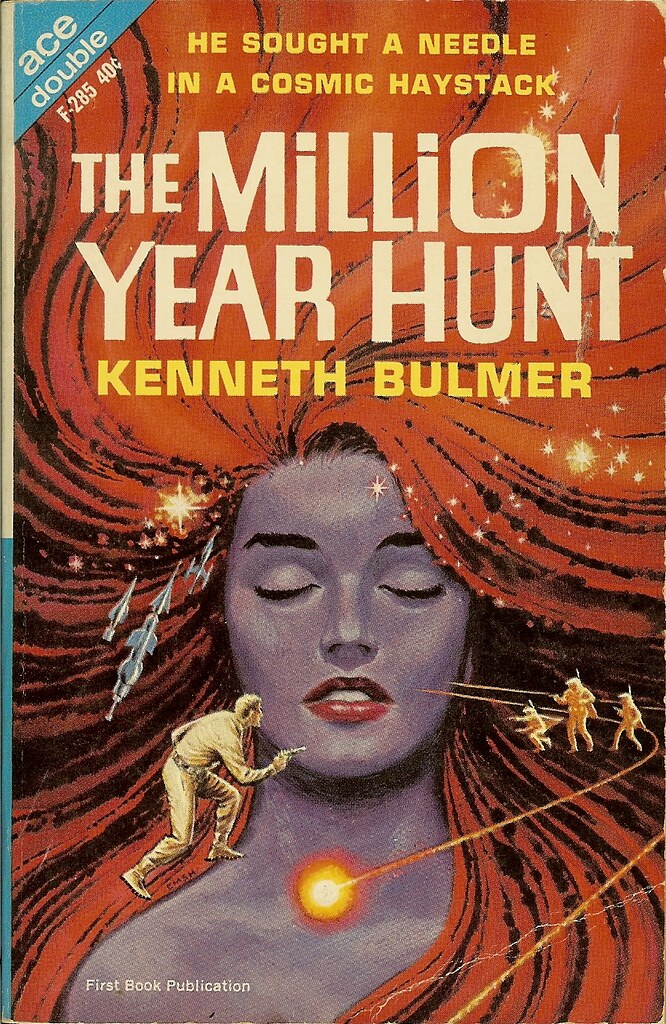
I felt like I was reading a much larger story that had been brutally and awkwardly chopped down to fit a page count limit. Up to the very last sentence the story is rife with major plot points that are not resolved, gawky transitions of emotion within the cast of characters, and plot twists that feel last minute and cheap. I can't overstate the issue that lies with the jerking sensation the reader gets as the story shifts from scene to scene. So awkward and halting was the pace that I just couldn't believe Bulmer was the one to give it a final proof read before sending it to publication. There was just no way a man as prolific as him could have been satisfied with this story, a public presentation by which he would be judged as a writer, going to press in the state it's in.
If "The Million Year Hunt" is indeed the butchered result of a much larger manuscript, then the most tragic victims of its murder were the emotional transitions of the characters and the quirky, adventurous and lighthearted atmosphere that was so desperately trying to take hold. The easy and funny dialogue between Arthur Ross Carson and the alien conscious that strapped itself to him nervous system is very entertaining to read. Their banter actually comprises some of the best scenes in this story. Instead of clunky exposition their conversations dynamically teased out information on their respective pasts, personalities, and surroundings.
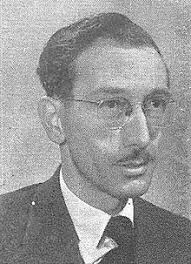
If only Bulmer could have let the characters be themselves stumbling through space on adventures loosely tied to an end goal, specifically Carson's mission of revenge and his origin as the "savior" of the Galactic Guard, then this would have been a fantastic story. Unfortunately in its current state "The Million Year Hunt" is not a story that should have made it to print.
[Apparently, The Million Year Hunt is a fix-up of sorts, created from Scarlet Denial in Science Fiction Adventures No. 26, and Scarlet Dawn in Science Fiction Adventures No. 28. Both came out in 1962, published in the United Kingdom. The text is unchanged from the originals. (ed)]
"Ships to the Stars" by Fritz Leiber
On the other side of this Ace Double is a collection of six short stories by power house actor and novelist Fritz Leiber. In contrast to Bulmer's story, Leiber's "Dr. Kometevsky's Day", "The Big Trek", "The Enchanted Forest", "Deadly Moon", "The Snowbank Orbit", and "The Ship Sails at Midnight" are all well structured with tight plots and developed characters. Leiber's writing also demonstrates a more measured understanding of how to maintain the flow of a story. The tendency of his characters to repeatedly ponder the effects fear has on them makes them fragile, fallible, and very true to the duality of human nature. They want to know and see everything, but there are limits to what they can understand and what their eyes have access to. Leiber's inclusion of these relatable and basic human failings forms a tension in his stories that would be otherwise missing if he had held full faith in humanity's ability to rationalize everything with science.
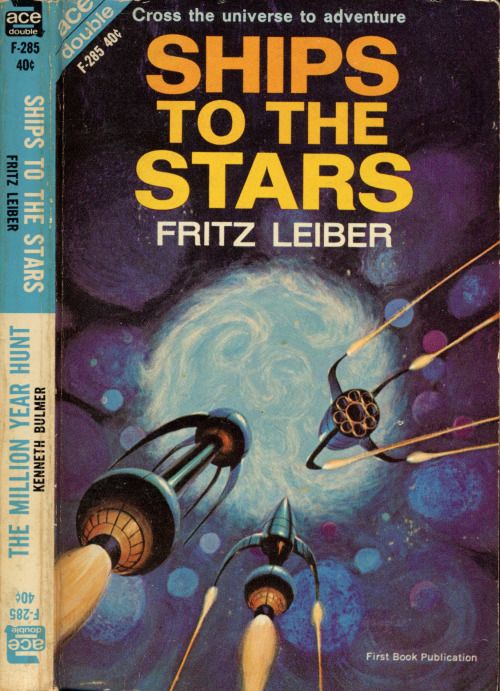
The strongest short stories in this small selection were "The Big Trek" and "The Ship Sails at Midnight". In these two tales the reader can really see Leiber's deep connection with the gothic authors whom he draws inspiration from. In "The Big Trek" Leiber writes from the first-person perspective of a man joining a feverish march of bizarre beings from across the universe. The employment of fluctuating space and loose concepts of time's passage echoes William Hope Hodgson's "The House on the Borderland" (1908) and pretty much any piece by Edgar Allan Poe. The narrator's awe and trepidation touched with excitement are also very similar to Arthur Machen's inner voice within "The White People" (1904).
Like H. P. Lovecraft and Lord Dunsany, Leiber's strongest talent as a writer is keeping his characters grounded by the weighty truth that humans are far from the most powerful forces in the universe. All of Leiber's stories have humans sprinting to stay out of the way of some larger, stronger entity charging through with little interest in our species’ plight. "The Ship Sails at Midnight" best encapsulates this with its accompanying message that humans have such potential but are so readily self-sabotaging.
The joy of reading Fritz Leiber’s short stories greatly made up for my disappointment in Kenneth Bulmer’s novella. Fast paced, thoughtful and touching, they make this Ace Double a worthwhile purchase. I will absolutely be looking forward to reading more of his work in the future.
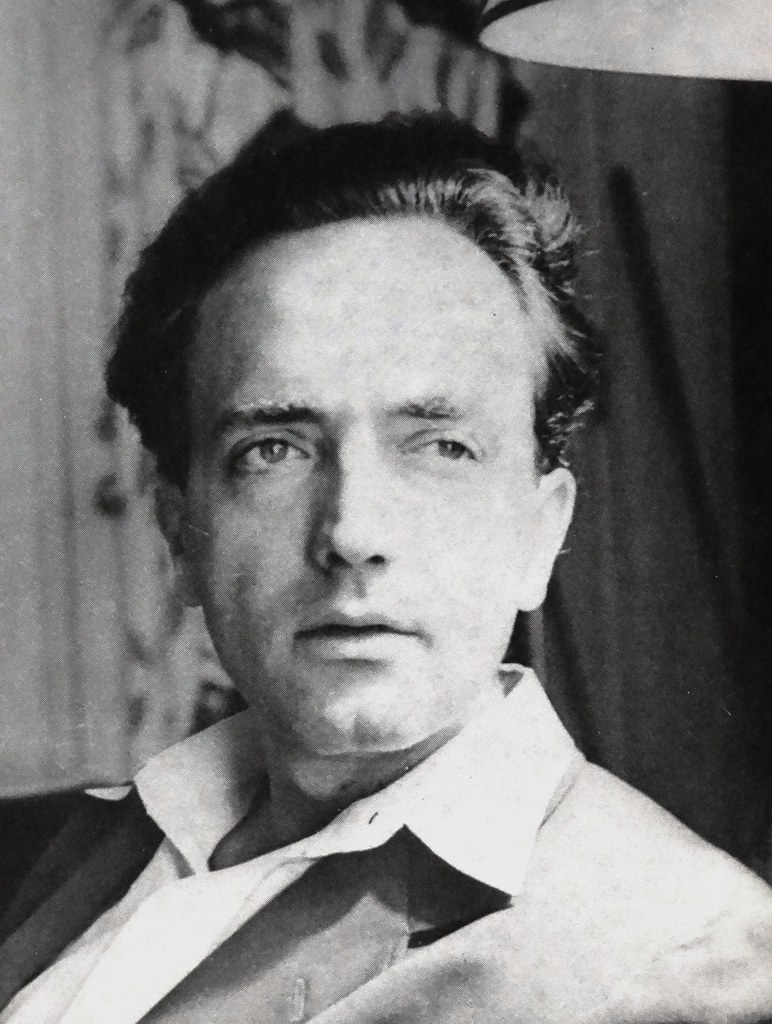
[Come join us at Portal 55, Galactic Journey's real-time lounge! Talk about your favorite SFF, chat with the Traveler and co., relax, sit a spell…]

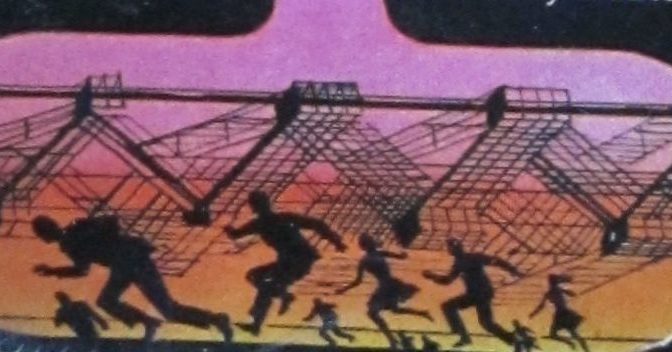

Thanks to our multiple authors for excellent, thoughtful reviews.
I'll keep the new PKD novel in mind. Sounds very good.
I've read most of the stories in the Leiber collection, and they're all fine works.
Just trying to uphold the standard you set!
I have the Dick and the Ace-Double on order but wasn't sure about the Farmer. From these reviews I probably made the right choices.
Is Dr. Bloodmoney out already? I thought it wasn't coming out til next year, am I getting of confused by the weird schedules we have in the UK? Or was Mr. Sacks overexcited like the rest of us PKD fans and meant to put in Game Players of Titan or Martian Time-slip? If it's out already I will make sure pick up a copy next time I am on a business trip across the Atlantic.
Thanks, Hammard! With PKD, weird time-slips are all too common…
(and yes, you can skip the Farmer. It's not bad, but there's much better out there)
Hammard, my apologies. You are right. I was looking forward to reading “Dr. Bloodmoney” in two months. I adored “Martian Time-slip” and should have referenced that novel.
We're all excited for Dr. Bloodmoney so is understandable! It was written last year so I agree with your impatience.
I keep parsing TONGUES OF THE MOON as TONGUES ON THE MOON, and thinking of the old wife's tale about the dumb kid who stuck his tongue onto a frozen pipe in winter and got it stuck there. I'm sure sticking your tongue ON the moon, especially on the dark side, would be even more painful, and it seems strange to me that apparently multiple people would do it. (Especially since such glory as was involved would presumably accrue only to the first idiot to do it.)